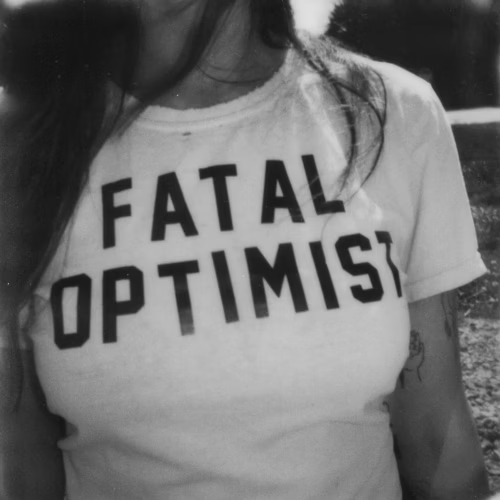I still think back to Treefort Festival last year, standing shoulder-to-shoulder with strangers as Madi Diaz cracked a joke about ruining everyone’s night with her sad tunes. Half the room laughed, the other half blinked away tears. A few of us managed both at once. It was the kind of set that leaves you rattled in the best way—funny, devastating, and disarmingly human. That same fragile-yet-direct spirit runs through Fatal Optimist, her most stripped-back and affecting record yet.
This is the final chapter in what feels like a trilogy of heartbreak, following 2021’s History of a Feeling and last year’s Grammy-nominated record Weird Faith. If those records explored grief in its tangled middle stages, Fatal Optimist is the comedown: the stillness after the storm, the sharp ache of solitude.
Diaz leans all the way in. After walking away from initial studio sessions in New Jersey, she started the process over in Southern California with producer Gabe Wax. The result is a record pared down to its barest form—mostly just voice and guitar.
Working with Wax, Diaz stripped everything down. No lush studio camouflage, no safety net; just voice, guitar, and the occasional brush of accompaniment. The effect isn’t showy, but it’s startling in its intimacy. The songs feel lived-in, unvarnished, and quietly insistent, as if Diaz has pulled up a chair in your living room and is telling you the truth, whether you’re ready for it or not.
Opening track “Feel Something” sets the tone. It’s a song equal parts panic and yearning, swinging between urgent acoustic strums and languid guitar lines as Diaz spits out lines that balance humor and heartbreak. “I used to think I needed to read your mind… and then we’ll fuck and then we’ll fight,” she sings. It’s funny, brutal, and instantly recognizable for anyone who’s tried to wring connection from something already gone cold. That phrase—“Fuck my life, goddamnit I might!”—lands like a thesis statement for the whole record: desperate, ridiculous, utterly human.
Across the album, Diaz traces the phases of dissolution with unnerving precision. “Island,” written during her self-imposed exile after a relationship collapse, bristles with embarrassment and rage before softening into resignation. “Already Gone” aches with the clarity that always arrives too late. Each track is fragile but direct, deceptively simple but emotionally vast. There’s nowhere to hide in these arrangements, no walls of sound to blur the sting. It’s just Diaz, staring you down and daring you not to flinch.
And yet, for all its rawness, Fatal Optimist isn’t about wallowing. There’s catharsis in these tracks, a strange joy in their brutal honesty. You find yourself singing along to lines that should leave you gutted, though somehow you feel lighter for it.
The record closes with its title track, where Diaz finally lets a full band in. After so much sparseness, the sudden swell is almost shocking like a rush of color after months in monochrome. It’s the sound of movement, of choosing life again.
Diaz describes fatal optimism as the belief in magic despite knowing the risks—the willingness to leap even while bracing for the fall. This record embodies that paradox perfectly. It’s a gut punch, yes, but a beautiful one: devastating, cathartic, and absolutely unforgettable.
With Fatal Optimist, Madi Diaz hasn’t just closed out her trilogy; she’s written a masterpiece of the heart.

